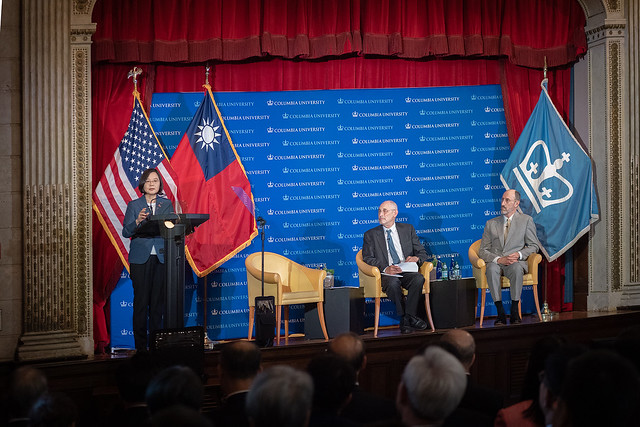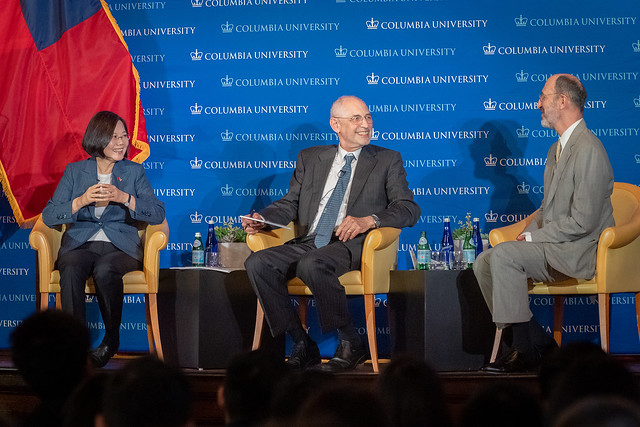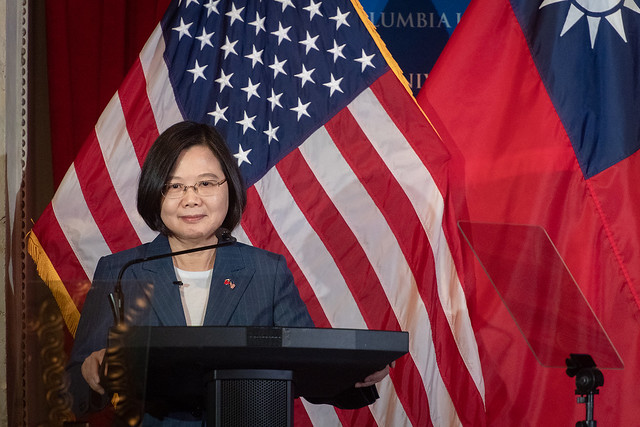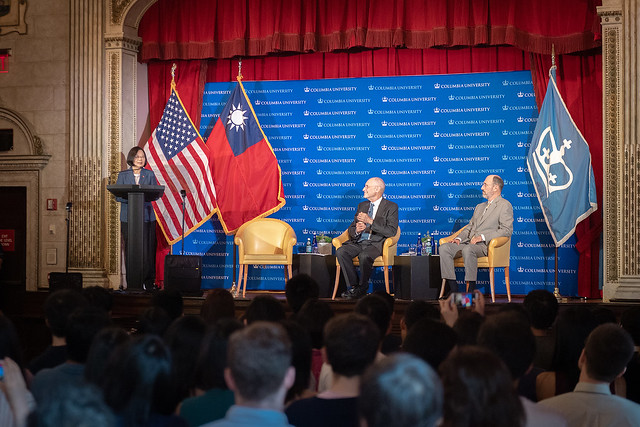News & activities
 News releases
News releases
President Tsai Ing-wen continued her Journey of Freedom, Democracy, and Sustainability with a discussion session at Columbia University in New York City on the afternoon of July 12 (early morning July 13 Taipei time). Her remarks addressed issues including Taiwan's path to democratization, lessons we learned from recent incidents in Hong Kong, the disinformation challenge that countries around the world are facing together, and the choice between democracy and economic development.
President Tsai was greeted upon arrival by Gerald Rosberg, Senior Executive Vice President of Columbia University. The discussion was chaired by Andrew J. Nathan, Professor of Political Science and chair of the steering committee of the Center for the Study of Human Rights at Columbia.
A transcript of the president's remarks follows:
Receiving an invitation to speak here from such a vanguard of free speech and diversity is actually quite an honor.
I graduated from Cornell Law School in 1980, and I have to say, being back on a New York campus brings back many memories. Though I'm sure many of you would say that any campus outside of New York City is not really part of New York.
However, I actually lived in the city in the summer of 1979, when I was doing research work for a professor at the East Asia Institute of Columbia University. Later on, I passed the New York Bar examination here, and visited the city from time to time, sometimes on my way to Washington DC for trade negotiations.
Life in New York in the 1980s was eye opening for a young law student from not quite democratized Taiwan. Diversity and different perspectives were the norm, and looking out across the lecture hall today, I am glad to see that has not changed.
Today, a story of "change" is exactly the story I am here to tell. It is the story of Taiwan. It is the story of how an island off the Chinese continent redefined the timeline for democratization, and set the standard for transitioning democracies around the world.
In the early days of our political transition, some said democracy could not survive in China's shadow. And Taiwan is now home to a thriving democratic society and political system.
Some said a resource-poor island of only 23 million people could not become a major economic player. Yet we are now the United States' 11th largest trade partner.
Some said progressive values could not take root in East Asian society. Yet I stand here before you as Taiwan's first woman president, and this year we became the first country in Asia to legalize same-sex marriage.
In short, Taiwan's story is one of seemingly improbable success. Many call Taiwan a "democratic miracle," but I don't believe in miracles.
I believe in the will of the people, and their vision for a better world.
Like the United States, our path to democratization was paved with the blood, sweat, and tears of those who came before us. Now the task falls to us to carry on their mission, and continue to bear the torch that lights the way for countries still on the path to democracy.
Ours is a heavy burden, and the path is not an easy one to walk. Because the challenges Taiwan's democracy now faces are wholly different from those we overcame decades ago.
And these same challenges face all democracies in the 21st century. Why? Because freedom around the world is under threat like never before.
We are seeing this threat in action right now in Hong Kong. Faced with no channel to make their voices heard, young people are taking to the streets to fight for their democratic freedoms. And the people of Taiwan stand with them.
Hong Kong's experience under "one country, two systems" has shown the world once and for all that authoritarianism and democracy cannot coexist.
Given the opportunity, authoritarianism will smother even the faintest flicker of democracy. The process may be gradual, so subtle that most don't even feel it.
Imagine: As authoritarian forces increasingly encroach on daily life, all of a sudden, it is illegal to sell a certain book in your store. You are brought in for questioning about a social media post criticizing a new policy. Before you know it, you feel some unseen force is monitoring your every move.
You begin to censor your own speech, your own thoughts. You no longer discuss current events with your friends, for fear of being overheard. You spend more time looking over your shoulder than you spend looking towards the future.
What I am describing may sound like some impossible future, far removed from the halls of Columbia University.
In reality, this situation is unfolding right before our eyes. That is why, now more than ever, Taiwan's story must be heard by the world.
Our story is one of perseverance, of a commitment to democracy against all odds.
Ours is a story of why values do still matter. The cultural and political differences across the Taiwan Strait only grow wider by the day; and each day that Taiwan chooses freedom of speech, human rights, the rule of law, is a day that we drift farther from the influences of authoritarianism.
Our story, our very existence, should serve as a wake-up call to the world that democracy is our most precious asset. We must protect it at all costs.
Day to day, Taiwan stands on the frontlines of democracy, faced with new threats unique to the information age. But we are not alone.
In fact, countries large and small around the world are now combating infiltration and cognitive warfare on a daily basis.
Authoritarian governments seek to exploit press freedoms unique to democratic societies to sow dissent among us. They hope to make us question our political systems and lose faith in democracy.
Taiwan has been on the frontlines of this battle for years, and we have a great deal of experiences to offer to the world.
In the digital age, disinformation can become fact in a matter of hours. But the greatest challenge in combating this threat is finding the balance between national security and freedom of speech.
In Taiwan, we have taken the first step by making it a policy priority.
We have strengthened our legal framework to identify and prevent the spread of disinformation. We are cracking down on intelligence leaks caused by external forces.
And with stronger intelligence sharing with other countries, we will be able to do even more to mitigate this threat.
But democracy faces other challenges as well, especially in the form of economic enticements with hidden strings attached.
Many countries around the world are being asked to choose between democracy and economic development, and it seems the right choice is becoming less clear by the day.
Yet in my time as president, Taiwan has continually shown the world that democracy and economic growth are not only mutually beneficial, they are irrevocably intertwined.
Our economy has suffered from a reliance on the Chinese market that limited our autonomy in cross-strait affairs. China exploited this reliance as a means to infiltrate our society, an attempt to use it as a bargaining chip to be traded for our democracy.
But Taiwan was determined to open a new path to economic development. And what is democracy if not a market for creativity and new ideas?
We set about transforming our economy, creating an investment-friendly climate that is bringing Taiwanese firms home in record numbers. At the same time, foreign companies, especially the major ones, are expanding their operations in Taiwan as well.
This year alone, they have invested billions of US dollars in our economy and created tens of thousands of jobs. And the investment flows will continue to grow in the years to come.
We have worked to play a constructive role in a regional rules-based trade order, and develop stronger trade relationships with South and Southeast Asian markets.
Our New Southbound Policy has brought outstanding trade growth in the region over the past three years, and more importantly, that growth is sustainable.
As countries around the world fall victim to hidden debt traps, we remain committed to sustainable cooperation emphasizing mutual development, and our partners in South and Southeast Asia can attest to the benefits.
While China focuses on poaching our allies and isolating us, we focus on engaging in projects that make these countries better places to live.
In countries around the world, we are helping build economic and democratic capacities, 21st century-ready workforces, and transparent physical and digital infrastructure.
Once again, Taiwan provides a model for constructive development around the world. We refuse to engage in predatory behavior, and we have proven time and again that honest and open cooperation produces real, long-term results.
We have been able to successfully adapt to the challenges of the US-China trade war not despite our democracy, but rather, thanks to it. Our democratic system makes us open to diverse and innovative ideas, giving us the flexibility to break the mold when the mold no longer fits.
So to all the people who ask me how to make the choice between democracy and economic growth, I say the choice is clear: the two are inseparable.
History tells us that democracies are strongest when united, and weakest when divided.
Without Taiwan, the international coalition of like-minded countries will lose a crucial link in working to ensure our values are passed on to the next generation.
Taiwan stands as a rare example of a country that has both experienced authoritarianism and championed democracy in the modern age. That is why it is now more important than ever for the international community to support a free and democratic Taiwan.
Taiwan’s survival is about more than just cross-strait relations. We are a vital bastion of democracy in the Indo-Pacific, and the entire world is closely watching the precedent we will set for the future of democracy.
As a member of a global community of like-minded countries, I know we do not stand alone.
In the words of Herbert Hoover, "Freedom is the open window through which pours the sunlight of the human spirit and human dignity."
The challenges ahead of us may be daunting, but the international community stands with us, and Taiwan stands determined.
Together, we can allow this light to shine across all corners of the globe, if we only choose to open the window, and look out upon the future that awaits us.












